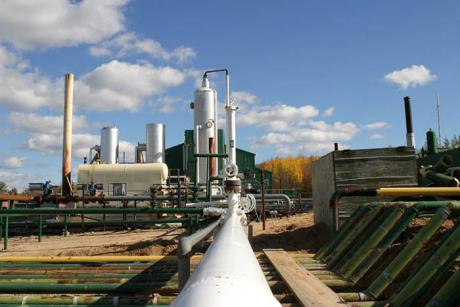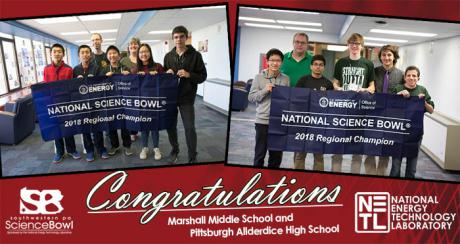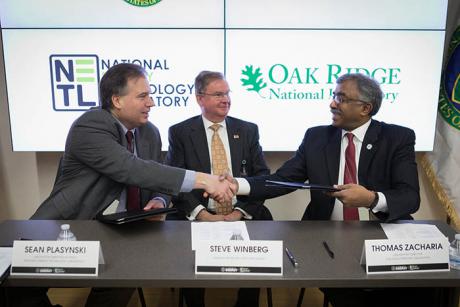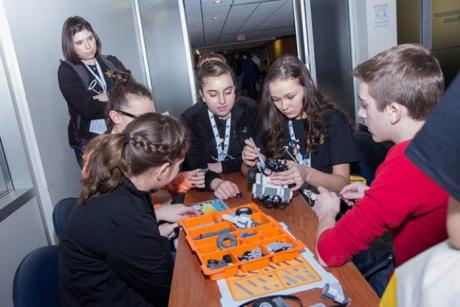The U.S. Department of Energy’s (DOE) Office of Fossil Energy (FE) has selected two projects to receive approximately $2.8 million in federal funding for cost-shared research and development projects. The projects will advance solid oxide fuel cell (SOFC) technology and make progress toward enabling cost-competitive fossil-based power generation with near-zero emission. Fuel cells are a modular, efficient, and virtually pollution-free power generation technology.
The NETL-managed Midwest Regional Carbon Sequestration Partnership (MRCSP), led by Battelle, has achieved an important milestone by safely and permanently storing one million metric tons of carbon dioxide (CO2) into a series of depleted oil fields in northern Michigan, leading to the production of a significant volume of oil that would have otherwise been left behind.
The U.S. Department of Energy’s Office of Fossil Energy (FE) has announced up to $7 million in federal funding for cost-shared research and development (R&D) projects under the funding opportunity announcement (FOA) DE-FOA-0001830, Transformational Pre-Combustion Carbon Capture Technologies.
The U.S. Department of Energy’s (DOE) Office of Fossil Energy (FE) announced up to $10.4 million, subject to availability of appropriations, in federal funding for cost-shared research and development projects.
Pittsburgh Allderdice High School from Squirrel Hill and Marshall Middle School from Wexford, PA, claimed victory at the 27th annual Southwestern Pennsylvania (SWPA) Regional Science Bowl held Feb. 24 and March 3, 2018, at the Community College of Allegheny County’s South Campus, in West Mifflin, Pa. About 40 teams from high schools and 32 teams from middle schools throughout SWPA participated in the competition, co-sponsored by the U.S. Department of Energy’s (DOE) National Energy Technology Laboratory (NETL).
Two U.S. Department of Energy (DOE) National Laboratories with energy research expertise are joining forces to pursue research on new ways to use coal to create innovative high-value products. A memorandum of understanding (MOU) was signed today by representatives of Oak Ridge National Laboratory (ORNL) and the National Energy Technology Laboratory (NETL) at NETL’s Pittsburgh site. DOE Assistant Secretary for Fossil Energy Steve Winberg attended the signing event.
Pittsburgh, Pa. – Sean I. Plasynski, Ph.D., a 28-year veteran of federal fossil energy research, has been named acting director of the National Energy Technology Laboratory (NETL).
Plasynski was named to the leadership post by U.S. Department of Energy (DOE) Assistant Secretary for Fossil Energy Steven Winberg following the retirement of Grace Bochenek, Ph.D., who served as director for three years.
When 17th-century Dutch scientist Anton van Leeuwenhoek fashioned the world’s first real microscope by polishing lenses and positioning them in a tube that produced magnifying power, he opened doors to a new world in which people could view objects as small as one millionth of a meter. At the time, van Leeuwenhoek couldn’t have known that 350 years later, his technology would become so advanced that scientists would be using it today to tackle some of the 21st-century’s greatest challenges.
Nine thousand high school students, more than four thousand middle school students, and thousands and thousands of volunteers have come together to put on a competition like no other since 1991. The U.S. Department of Energy manages and sponsors the National Science Bowl, a nationwide academic competition that tests students’ knowledge in all areas of science and mathematics, each year in Washington, D.C. during the month of April.
The U.S. Department of Energy (DOE) has selected six projects to receive $17.6 million in federal funding under the Office of Fossil Energy’s Novel and Enabling Carbon Capture Transformational Technologies funding opportunity announcement.














